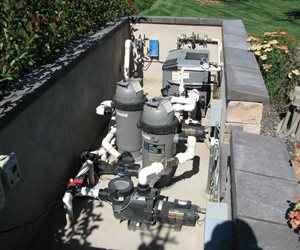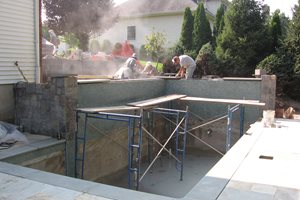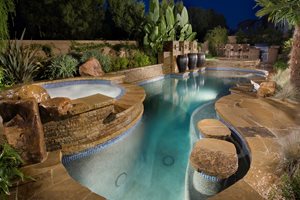Pool Equipment
Learn about the filters and other equipment needed for maintaining a poolWhat you don't see can be the most important part of your swimming pool. This includes all the mechanical equipment that keeps your water beautiful every day. While it's not that difficult to hide your equipment, it can be a challenge to make sure it's well away from the house and outdoor living spaces. No matter how quiet the pump, filter and heater may be when operational, you'll still hear it to some extent.
When laying out your pool, always include the pool equipment area in that process. This isn't just moving it far from the patio or bedroom because long runs of pipe or wire between your pool and equipment or the point of connection for water and electricity can greatly increase costs. Discuss this with your contractor or designer, and be sure to factor in a wall or other enclosure to screen off the equipment if it must be in the overall view of the landscape.
Filters
The filter is the most important piece of equipment that drives your pool. It removes dirt and debris from the water to keep it clean. They work with the pool pump that forces water through the filter. Many high end pool designs or features depend on water quality to look their best. As a result, the filters specified for these applications actually polish the water by removing the most minute particles. Each filter is gauged for certain particle sizes expressed in microns, which are the smallest particles it captures.Sand filter - 20 microns.
This is the most commonly used type of pool filter. Advantages are ease of operation and relatively low cost. Disadvantages are the need to backwash to clean filter periodically.
Cartridge filter - 10-15 microns.
This is the low maintenance filter because it utilizes filter cartridges that are replaced every one to two years depending on how the pool is used. This filter is less expensive, but you will have to buy new filters as required for the life of the unit.
Diatomaceous Earth - 3 to 5 microns.
Diatomaceous earth is a soft sedimentary rock that is naturally light and porous. It's crushed into a fine powder for use in the most efficient of all pool filters able to super clean water quickly by capturing the smallest particles. This is the most expensive filter option and new diatomaceous earth must be added to the unit after each cleaning or backwash.
Salt and Ozone Systems
Salt water and ozone systems were developed to reduce the demand for chlorine in swimming pools by changing the way the water is cleaned. Both are viable for new pools, but the best one for any project should be chosen carefully."We haven't done a chlorine pool for ten years," says Chris of Cipriano Landscape Design in New Jersey. Salt water pools are a powerful innovation that uses a chemical reaction to turn salt into chlorine, eliminating the demand for regular chlorine treatment. But salt water pools can be complex to maintain over time. "We are exclusively building salt water pools. For us the critical point is proper maintenance of the salt water system. We've never had a problem."
Cipriano and other companies are using ozone light filtered systems. "We prefer ozone strictly for indoor pools. In our rainy season, larger pools have problems with ozone because so much fresh water is being added at one time. They can't maintain proper levels.
On the arid west coast, Shea Alderete of Alderete Pools feels differently. "We find that salt corrodes everything, in particular the tiny springs within the mechanical pool systems. Another problem is that pool maintenance companies are having a hard time keeping up the salt systems that require a great deal of time and detail to run it properly. Some pool care guys will abandon the salt and simply add chlorine while the owner is unaware of the change. That's why we are now installing ozone filters which cost the same as salt systems to install but long term maintenance is simple and inexpensive."
These two differing opinions from luxury pool builders demonstrate that climate is key to making this choice. In the arid west the evaporation rates are much higher than in the east, and this may influence the corrosion factor. In the east, summer rainfall is a big factor in water quality. It underscores the importance of understanding the influence of climate on these innovative alternatives to a standard chlorine system.
Heaters
Not all pools will have a heater, but the majority of newly installed pools do include one of the modern energy efficient units. Another strategy can increase the efficiency of a standard unit through some simple relocation of the warm water source.On the west coast, Alderete Pools developed their own unique system to speed pool and spa heating. "We looked at the older pools where heated water supply is located just six inches below the waterline. This system wasn't heating the bottom of the pool adequately because warm water rises to the surface. It's why heating vents are in the floor, not up by the ceiling of a house where heat collects anyway. So we worked with a manufacturer to create a system that puts the hot water supply at the bottom of the pool, its deepest point. This increased heating efficiency 60 to 70%. With our system it takes just 12 hours to heat the pool instead of a whole week. This is unique to our company."
How Many BTUs Are Necessary?
Like your home furnace, pool heaters are rated by their output expressed in BTUs. One BTU is capable of raising the temperature of one pound of water by one degree. The larger the pool the more BTU output required from the heater.
The most efficient pool heaters run on propane, natural gas and even fuel oil for the most economical way to heat your pool. However, in recent years air quality and environmental standards have discouraged some of these systems and some communities may no long allow their use. The solution is a swimming pool heat pump that is not only cleaner, it is a quiet alternative that may prove less expensive than gas fired heaters. This efficiency is worth exploring with your pool contractor because a heat pump will cost more to buy, but over time the energy dollar savings may make this a wise choice.
While solar voltaic is still debatable as a home electric alternative, solar heating of a swimming pool is proven over time highly successful. But solar isn't for every site nor every climate due to its orientation and need for uninterrupted solar exposure. In regions where the skies are often cloudy such as the Pacific Northwest, solar pool heating may not be very successful. In Arizona where the sun shines all year around, solar pool heaters are much more effective. Solar also depends on your ability to mount the panels on a south facing slope or roof top. Without that southern exposure, solar may not be an option.
In New Jersey, Cipriano Landscape Design is a leading luxury pool builder. "It is our recommendation that a solar heating system should always be supplemented with a natural gas system," says Chris Cipriano. "Solar heating is great for maintaining a constant temperature but is not intended to quickly raise the temperature of your pool. A solar heating system will also typically struggle to produce heat in extended periods of cool, shady or rainy days. For pool designs with spas, a natural gas system is essential to quickly heat up the spa and maintain temperature over 100 degrees."
"Solar heating works by installing solar collectors onto the roof of your house or cabana which connects through pipes to your pool's existing heat pump system. The pool water is pumped through the existing filter. Then, depending on which solar heating system you chose, it is pumped through a heat exchanger or up through the solar panels on the roof. Once the pool reaches desired temperature, the system automatically switches off and the pool water bypasses the solar heating system on its route back to the pool. The pool automatically switches back on as needed to maintain a constant, comfortable temperature. On a sunny day, a solar heating system will raise the temperature of the pool about 1 to 2 degrees a day (under optimal conditions), which is significant when you remember that it's free heat."

 Backyards
Backyards
 Front Yards
Front Yards






